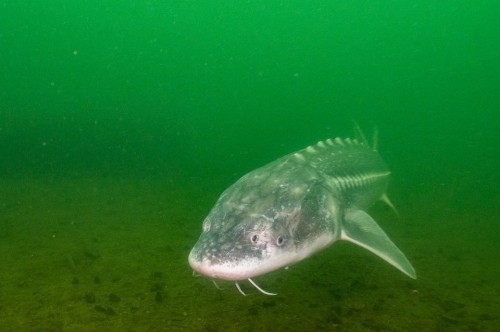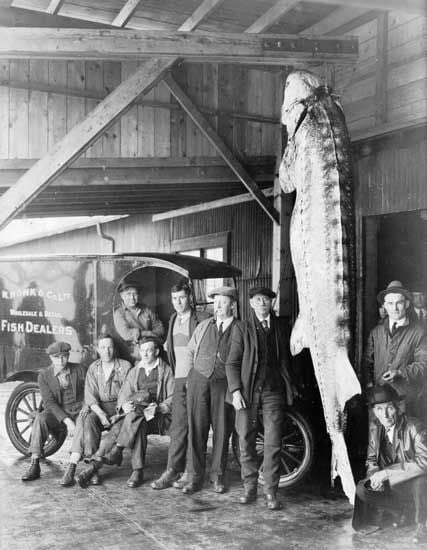SPECIES ID / Freshwater Fish of the Fraser Valley
Sturgeon Family (Acipenseridae)
White Sturgeon
Skwó:wech
Acipenser transmontanus
Identification Tips:
• Top lobe of caudal (tail) fin is much longer than bottom lobe
• Rows of bony plates (scutes) along the back and sides
• Large broad head with small eyes,
• 4 barbels in front of mouth
• Dorsal fin: 44 - 48 soft rays
• Anal fin: 28 - 31soft rays
• May exceed 4 m in length (historical record of 6 m from lower Fraser River)
• Grey, pale olive or grey-brown above to grey or white below
Conservation Status:
| British Columbia | Canada | Natureserve | |
| COSEWIC | Species at Risk Act | ||
| Red List | Threatened | None | G4, S2 |
Information Source: BC Conservation Data Centre: http://a100.gov.bc.ca/pub/eswp/
Life History:
• The world's largest freshwater fish
• Bottom feeder; juveniles feed on aquatic insect larvae, crustaceans, and molluscs; adults feeding on mainly fish
• Spawn during high flows of freshet May - July
• Males mature by 1 years, females by 20 years
• May live more than 100 years
• Tagged adults routinely move hundreds of kilometres in a year (e.g. Yale to New Westminster and back)
Habitat:
• Most adults are permanent residents of large river channels
• Juveniles rear in estuary or side channels
• Spawn in side channels over gravel or sand substrates in currents greater than 1.5 m/s
Range:
British Columbia
• Breeding populations limited to main stems of Fraser and Columbia Rivers and their largest tributaries
• Adults occasionally found in sea and estuaries of Vancouver Island
Global
• Large rivers, estuaries and inshore marine waters from Gulf of Alaska to Monterey, California.
Comments:
• There are 6 distinct populations recognized in British Columbia
• The Lower Fraser River population is the only one not currently listed as Endangered under the Species at Risk Act
• Lower Fraser population also appears to be in decline, as fewer juvenile fish are being encountered than in the past.
––––––
Primary Information Source:
McPhail, J.D. 2007. The Freshwater Fishes of British Columbia. University of Alberta Press. Edmonton, Alberta.



